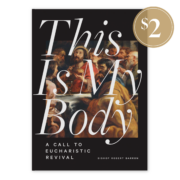In 1986, Russell Kirk gave a commencement address to the graduating class of La Lumiere boarding school in Laporte, Indiana. The speech itself is a beautiful reflection on how the students might influence a decadent age. He points to C.S. Lewis’ fourth book of the Chronicles of Narnia, The Silver Chair, in which Prince Rilian has been captured by the Lady of the Green Kirtle and enslaved in her Underworld. In this subterranean realm, the witch-queen tries to persuade Rilian that the meager light within the Underworld is the only source of illumination, that the sun does not exist. She convinces her captives to repeat the phrase, “there is no sun . . . there is no sun . . . ” (Lewis offers such an excellent way of conveying Plato’s cave for kids in this parable, by the way.) Kirk explains that the modern world is chock full of “intellectuals” who bandy about convincing people of scientism, positivism, fatalism, nihilism, and thousands of other gloomy ideologies, thereby convincing us that their little “lamps” of abstract nonsense are the only source of light. “Such persons insist that life has no purpose except sensual gratification; that the brief span of one’s physical existence is the be-all and end-all,” Kirk states. “Such twentieth-century sophists have created out of their murky cave of the intellect, an Underland; and they endeavor to convince us all that there is no sun—that the world of wonder and hope exists nowhere, and never did exist.”
Turn on any news station today, log in to any social media platform, and one can easily see that Kirk’s insight is just as timely today as it was in ’86. Now, rather than society having a few “intellectuals” floating around on college campuses, ideologies are given a full bullhorn through which the 24-hour noise machine and mindless scrolling devices convince us that the Underland contains the only source of light. We are told that the in-fighting and finger-wagging of the digital world are the “real” conversations. The “bold,” “new,” or “critical” sciences and models of modern anthropology are how “mature” or “intelligent” people think, regardless of how these ideologies might sit with your common sense.
We have convinced ourselves that ideas deserve more attention than human persons by making people into abstractions.
But, while more and more trusted institutions fall prey to the god of ideology ensnared in the Underland, it is up to every man and woman who desires more than what the witch-queen can offer to take the mission of redeeming the time seriously.
So, what does Kirk recommend we do? “Begin by brightening the corner where you are; by improving one human being, yourself, and helping one’s neighbors. Thus are formed what the early Christians called ‘the colonies of God.’” It seems to me that one of the witch-queen’s tactics today is to distract everyone from doing this exact thing. We’re all bombarded with worldwide news and the lives of people we don’t personally know, spending far too much time concerning ourselves with everything other than what is right in front of us. We have convinced ourselves that ideas deserve more attention than human persons by making people into abstractions.

I know I’m just as guilty of allowing my headspace to be filled with problems around the world and not being truly present around my own family. I’ll be watching my daughter playing volleyball while thinking about international politics, which I have zero ability to influence (and I would never want such power). We want to solve the world’s problems while our spouses, children, and friends just want our time and attention. The witch-queen of our age has convinced us that there is no light outside of 4K talking heads. But I want the sun, and I believe most of humanity does. It is okay to realize that most of us are powerless in the grand scheme of things; Kirk notes that money and power are not needed to redeem an age. Instead, we can refuse to state the prevailing mantras and seek out the sun through grace, virtue, imagination, and reason.
Kirk goes on to offer an excellent daily reminder to keep our eyes on the source of Light:
If only you and I could remind ourselves, every day, that we are even now in eternity; that our actions of anger or lust or violence endure forever; but that our actions of generosity or love or forgiveness will be with us beyond the end of Time—why, how immensely better men and women you and I would be! At the very least, how much we would save our years from becoming, in Eliot’s lines, “the waste sad time / Stretching before and after.”
Kirk echoes many theologians of the twentieth century who taught that we create heaven and hell within ourselves every day. Grace is at play here, but what we fill our minds and time with undergirds the creation of paradise or hell for ourselves and those around us. By reminding myself every day that my actions are the only thing within my control and that those actions should focus on “brightening the corner” of my little microcosm, the stress of needing to perfect the world falls away.
While some might be called to the grandiose task of making national and international decisions, most of us are just tasked with our little corner. And guess what? That makes much more of a difference than you think.
Our lives will feel far more fulfilling if we alter our mindset to focus on those we love and shower them with affection, adventure, and a formation in the moral imagination.
Our collective disenchantment with institutions does offer us all a unique opportunity: building up smaller communities with the intent of redeeming the time. This does not mean escaping society altogether but rather eschewing any desire for cultural acceptance. We don’t need what Kirk calls the “glittering prizes of modern society.” I think specifically of the classical school movement as a prime example of “brightening the corner” by thinking generationally and making the sacrifices necessary to show children the sun. Awakening a child’s imagination through characters like Edmond Dantès and Jane Bennet or presenting Scripture as a lively adventure will do far more in creating a society of virtue than arguing about the ideological lamps of the witch-queen. Our lives will feel far more fulfilling if we alter our mindset to focus on those we love and shower them with affection, adventure, and a formation in the moral imagination. Echoing St. Thérèse’s Little Way, Kirk reminds his listeners that small acts of self-giving make a significant difference in the world.

Lastly, Kirk offers his final advice to the students that I think provides a breath of fresh air during a time of so much confusion and angst. While the advice might seem simple, it offers an entire worldview. He says,
Do not mistake a witch-queen for Our Lady. Do not fancy that the sorry policy of Looking Out for Number One will lead you to Heaven’s gate. Do not fail to remind yourselves that consciousness is a perpetual adventure. Do not forget the source of Light. All this creation about us is the garden that we erring humans were appointed to tend. Plant some flowers in it, if you can, and pull some weeds. If need be, draw the sword to defend it. The school of Light has sent you on your way, and I wish you all good traveling in your progress toward the Light Eternal.
I know that I am an unabashed follower of Russell Kirk, but I’ll take this advice over the ideological abstractions of modernity any day.
